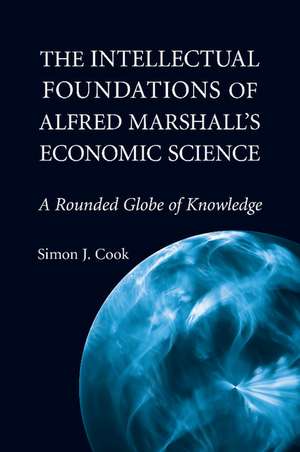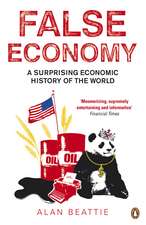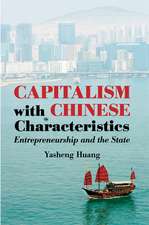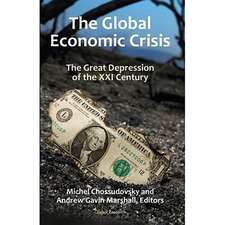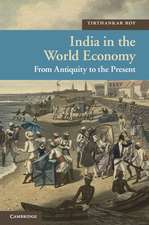The Intellectual Foundations of Alfred Marshall's Economic Science: A Rounded Globe of Knowledge: Historical Perspectives on Modern Economics
Autor Simon J. Cooken Limba Engleză Paperback – 25 mar 2015
| Toate formatele și edițiile | Preț | Express |
|---|---|---|
| Paperback (1) | 319.99 lei 6-8 săpt. | |
| Cambridge University Press – 25 mar 2015 | 319.99 lei 6-8 săpt. | |
| Hardback (1) | 728.05 lei 6-8 săpt. | |
| Cambridge University Press – 5 iul 2009 | 728.05 lei 6-8 săpt. |
Din seria Historical Perspectives on Modern Economics
-
 Preț: 322.86 lei
Preț: 322.86 lei -
 Preț: 200.09 lei
Preț: 200.09 lei -
 Preț: 277.57 lei
Preț: 277.57 lei -
 Preț: 307.58 lei
Preț: 307.58 lei -
 Preț: 288.62 lei
Preț: 288.62 lei -
 Preț: 277.65 lei
Preț: 277.65 lei -
 Preț: 430.14 lei
Preț: 430.14 lei -
 Preț: 350.91 lei
Preț: 350.91 lei - 11%
 Preț: 536.98 lei
Preț: 536.98 lei -
 Preț: 289.19 lei
Preț: 289.19 lei -
 Preț: 400.76 lei
Preț: 400.76 lei -
 Preț: 323.27 lei
Preț: 323.27 lei - 11%
 Preț: 577.27 lei
Preț: 577.27 lei -
 Preț: 331.09 lei
Preț: 331.09 lei -
 Preț: 357.37 lei
Preț: 357.37 lei -
 Preț: 395.17 lei
Preț: 395.17 lei -
 Preț: 286.69 lei
Preț: 286.69 lei - 14%
 Preț: 787.78 lei
Preț: 787.78 lei -
 Preț: 364.08 lei
Preț: 364.08 lei -
 Preț: 357.91 lei
Preț: 357.91 lei -
 Preț: 355.54 lei
Preț: 355.54 lei -
 Preț: 321.90 lei
Preț: 321.90 lei -
 Preț: 441.58 lei
Preț: 441.58 lei -
 Preț: 259.95 lei
Preț: 259.95 lei -
 Preț: 272.75 lei
Preț: 272.75 lei -
 Preț: 442.22 lei
Preț: 442.22 lei -
 Preț: 414.74 lei
Preț: 414.74 lei - 14%
 Preț: 728.05 lei
Preț: 728.05 lei -
 Preț: 266.98 lei
Preț: 266.98 lei -
 Preț: 392.82 lei
Preț: 392.82 lei -
 Preț: 309.49 lei
Preț: 309.49 lei
Preț: 319.99 lei
Nou
Puncte Express: 480
Preț estimativ în valută:
61.25€ • 66.55$ • 51.48£
61.25€ • 66.55$ • 51.48£
Carte tipărită la comandă
Livrare economică 21 aprilie-05 mai
Preluare comenzi: 021 569.72.76
Specificații
ISBN-13: 9781107514126
ISBN-10: 1107514126
Pagini: 352
Ilustrații: 1 b/w illus.
Dimensiuni: 150 x 230 x 20 mm
Greutate: 0.47 kg
Editura: Cambridge University Press
Colecția Cambridge University Press
Seria Historical Perspectives on Modern Economics
Locul publicării:New York, United States
ISBN-10: 1107514126
Pagini: 352
Ilustrații: 1 b/w illus.
Dimensiuni: 150 x 230 x 20 mm
Greutate: 0.47 kg
Editura: Cambridge University Press
Colecția Cambridge University Press
Seria Historical Perspectives on Modern Economics
Locul publicării:New York, United States
Cuprins
Introduction; Part I. The Contexts of Marshall's Intellectual Apprenticeship: 1. The state of long-term memories; 2. A liberal education; Part II. Dualist Moral Science: 1867–71: 3. Mental crisis; 4. The way of all flesh; 5. Political economy; Part III. Neo-Hegelian political economy: 1872–3: 6. A philosophy of history; 7. Missing links: the education of the working classes; Epilogue. 'A Rounded Globe of Knowledge': 8. Social philosophy and economic science.
Recenzii
'This careful analysis of Marshall's early writings offers a fresh perspective on the evolution of his ideas. For anyone who wants to understand the intellectual environment out of which Marshall's economics arose, this book is essential reading.' Roger Backhouse, University of Birmingham
'Simon Cook has identified the distinct and widely varying strands of Marshall's intellectual and social vision and rewoven them into a piece of whole cloth. This effectively redraws the map of Marshallian scholarship.' Neil De Marchi, Duke University
'An accurate, thoughtful, and fascinating account of the intimate and intricate connections between Marshall's political economy and the development of his philosophical thinking. A landmark in Marshallian scholarship.' Maria Cristina Marcuzzo, Università di Roma 'La Sapienza'
'Simon Cook's richly contextualized examination of the intellectual foundations of Marshall's economics challenges conventional views of Marshall and opens up new paths to understanding the man and his work. Cook's probing examination of Marshall's intellectual development is required reading for any scholar interested in Marshall the man, his system of economic analysis, and his legacy in modern economics.' Steven G. Medema, University of Colorado
'This reconstruction of the foundations of Alfred Marshall's social philosophy is the product of original research on the manuscripts that reveal the breadth and depth of Marshall's intellectual concerns during his apprenticeship years. In addition to being a thorough contextual study of the intellectual origins of Marshall's better-known economic writings, Simon Cook's book helps to explain those pervasive idealistic and historical dimensions to Marshall's work that have often perplexed even his closest followers.' Donald Winch, University of Sussex
'Simon Cook has identified the distinct and widely varying strands of Marshall's intellectual and social vision and rewoven them into a piece of whole cloth. This effectively redraws the map of Marshallian scholarship.' Neil De Marchi, Duke University
'An accurate, thoughtful, and fascinating account of the intimate and intricate connections between Marshall's political economy and the development of his philosophical thinking. A landmark in Marshallian scholarship.' Maria Cristina Marcuzzo, Università di Roma 'La Sapienza'
'Simon Cook's richly contextualized examination of the intellectual foundations of Marshall's economics challenges conventional views of Marshall and opens up new paths to understanding the man and his work. Cook's probing examination of Marshall's intellectual development is required reading for any scholar interested in Marshall the man, his system of economic analysis, and his legacy in modern economics.' Steven G. Medema, University of Colorado
'This reconstruction of the foundations of Alfred Marshall's social philosophy is the product of original research on the manuscripts that reveal the breadth and depth of Marshall's intellectual concerns during his apprenticeship years. In addition to being a thorough contextual study of the intellectual origins of Marshall's better-known economic writings, Simon Cook's book helps to explain those pervasive idealistic and historical dimensions to Marshall's work that have often perplexed even his closest followers.' Donald Winch, University of Sussex
Notă biografică
Descriere
This book shows how Marshall's distinctive contributions to modern economics grew out of his early development of a neo-Hegelian social philosophy.
